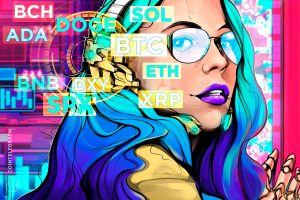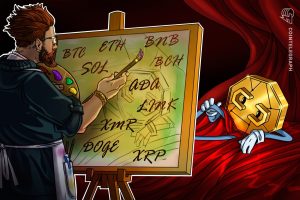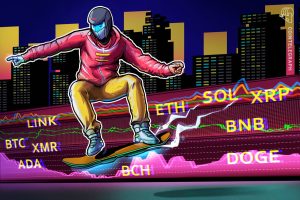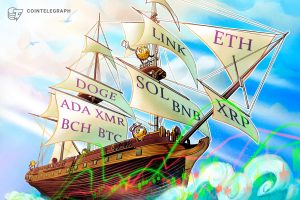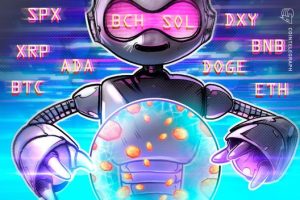Facebook, Tencent a ‘Threat’ to Open Metaverse: Animoca’s Yat Siu

In brief
Animoca Brands is valued at $2.2B following a new funding round, and has invested in more than 100 companies to date.
Executive Chairman Yat Siu tells Decrypt that Animoca’s focus is on building an open metaverse, painting Facebook and Tencent as “threats” to that.
Animoca Brands has cast a wide net with its investments into the crypto industry, investing in more than 100 startups—including leading NFT marketplace OpenSea and the creators of smash Ethereum-based game Axie Infinity. For Animoca, it’s all about contributing to the development of the emerging online “metaverse.”
We hear the term often in the crypto industry. The metaverse refers to shared online spaces that could be used for everything from work to play, not to mention social interactions, shopping, and more. NFT collectibles could become 3D avatars in the metaverse, for example, with asset ownership enabling new kinds of income streams for users.
It’s a potentially enormous opportunity for creators of all kinds. Given that, it’s no surprise to see tech giants like Facebook and Tencent pouring in sizable resources as they angle for power and prominence in the potential next evolution of the internet as we know it.
Animoca Brands doesn’t want that kind of future for the metaverse, however—and founder and Executive Chairman Yat Siu described those tech firms as “threats” to an open metaverse in an interview with Decrypt this week.
The Hong Kong-based firm’s biggest criteria for investment is that companies are building open, composable elements—whether it’s assets, tools, or platforms—that can fit into the company’s vision for a decentralized metaverse ahead. In other words: no walled gardens, or closed-off ecosystems like those from Apple and Google.
Siu is passionate about the potential for the metaverse, describing it as the defining focus for his company. He also sees a battle brewing between the projects and communities building open, interoperable tools for the metaverse and large companies that may try to co-opt the idea (and its potential profits) for their own benefit.
“In the digital world, the vast majority of the world lives on platforms and essentially doesn’t own the data. Therefore, we’re really just renters. And as a result, we don’t have anything worth fighting for,” said Siu. “I describe the age we’re living in as a kind of digital colonialism. The likes of Facebook are essentially the imperialists of our age, and they’re basically stealing our data.”
Facebook recently announced plans to pump $50 million into metaverse research and development over the next two years, and aims to hire 10,000 people across Europe over the next five to further its metaverse initiatives.
Amid concerns over its potential influence, the social media giant claims that “openness and interoperability” will be guiding principles of the metaverse, as it sees it. Chinese tech firm Tencent reportedly also has interest in the space, investing heavily in digital infrastructure and recently filing “metaverse” trademarks. E-commerce firm Alibaba has followed suit.
“We’re kind of in a hurry to make this happen,” Siu said of building an open metaverse. “The biggest threat is not regulators. I think regulators are necessary to keep the space proper and everything is secure […] I think the threat is Facebook, and the threat is Tencent.”
Into The Sandbox
On Wednesday, Animoca announced that it raised $65 million in new funding, boosting the firm’s valuation to $2.2 billion. It comes just months after Animoca completed a $138.88 million round in July, at a $1 billion valuation. Animoca already had major backers like Coinbase Ventures and Samsung, but the biggest fish in the latest round is arguably Ubisoft.
Ubisoft is one of the largest forces in gaming, as the brand behind huge game franchises like Assassin’s Creed and Just Dance, plus it was the first traditional publisher to begin exploring the blockchain gaming space with strategic partnerships and experimental NFT games. Siu said that Animoca will work with Ubisoft on further NFT-centric projects.
In addition to investing, Animoca publishes its own NFT-driven games—including licensed racing game F1 Delta Time and the upcoming The Sandbox.
The Ethereum-based Sandbox is effectively a playable chunk of the metaverse, providing a shared online world in which users can purchase NFT land plots, create their own interactive games on them, and even monetize those experiences as they share with other users.
“We don’t think The Sandbox will be the only place,” Siu said, emphasizing that the game world isn’t designed to be the metaverse on its own. “But it’s one of the first places that has become kind of like the digital Manhattan or the digital Beverly Hills,” he added.
With dozens of partners including rapper Snoop Dogg (a huge NFT enthusiast), The Walking Dead, and Atari, The Sandbox could become one the most visible examples of what’s possible with the metaverse. It has already racked up millions of dollars’ worth of NFT sales before a planned alpha launch later this year.
In Siu’s view, recently ballooning prices for some NFT collectibles—in a market that yielded $10.67 billion in trading volume in Q3 2021—are a result of millions of people rapidly becoming hip to the idea of digital ownership. It’s a type of widespread adoption of early pieces of the coming metaverse, before we’re even immersed within it.
“Imagine New York City going from a couple hundred thousand people to millions of people—except in a month,” he said. “It would go crazy with the value, and everything would just explode. That’s what’s happening right now in the metaverse, because there’s real economics at play, and you have mass immigration coming in at a fast scale.”




